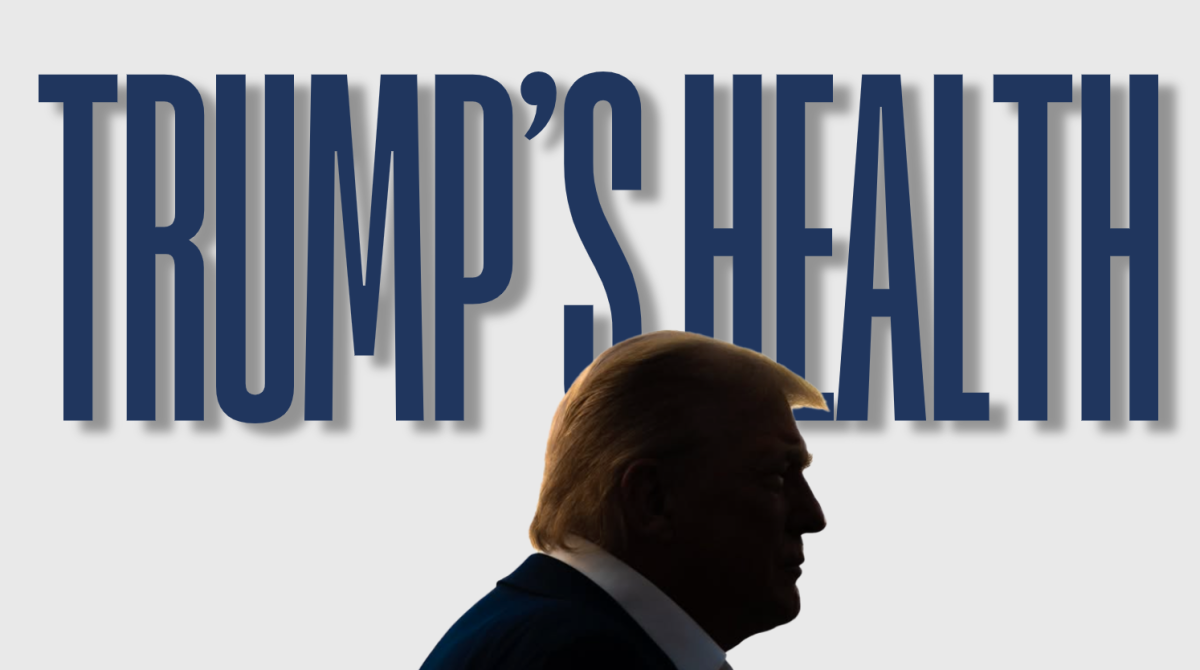Observing the first eight months of Donald Trump’s presidency, I have begun to wonder whether he can fulfill his duties as President of the United States. Not because of his policies or rhetorical style, but rather because of his health. Just in July of 2025, a poll conducted by Data for Progress found that many Americans are now starting to fear if Trump is cognitively sharp enough to handle the job. My concern, however, does not just lie with what Trump is not saying or doing, but rather with what the White House is not saying.
Is the Trump administration withholding information about the president’s health? I believe they are. And these types of troubles can intensify to a point of no return. For example, in April, the White House released Trump’s annual physical examination conducted by the Physician to the President, U.S. Navy Captain Sean Barbabella.
“President Trump exhibits excellent cognitive and physical health and is fully fit to execute the duties of the Commander-in-Chief and Head of State,” Barbabella wrote. But then in July, photographs showed Trump with bruising on his hands covered with makeup, and swollen ankles. Public pressure forced the White House to announce that Trump had been diagnosed with chronic venous insufficiency. The White House claims Trump’s condition is “benign and common,” but medical experts say it can be a sign of larger health problems, such as a weakening cardiovascular system. The makeup on his hands has been a critical part of some Americans’ suspicions that the White House is attempting to conceal issues with Trump’s health. White House Press Secretary Karoline Leavitt previously told the Daily Beast that the bruising on his hands was due to “frequent handshaking and the use of aspirin.” Furthermore, Trump is no stranger to withholding information about his health while in office; he received the COVID-19 vaccine right before leaving office in 2021, while refusing to encourage Americans to get vaccinated. The public only learned about this months after.
Where this issue can get complicated is this: publicizing information about the president’s health can undermine national security. Reasonably, some fear that foreign adversaries could take advantage of such sensitive information. Despite these risks, withholding that same information can also be a national security risk. Misinformation from the government, if not checked and called out, can cause confusion and mistrust, destabilize or delegitimize a government’s authority when the truth comes out. Look what happened when the Biden administration ignored concerns about former President Joe Biden’s age and mental fitness, before a disastrous debate performance revealed the truth of the situation. To keep the president honest, I would suggest there should be a team of medical experts who conduct routine studies on the president, or perhaps all presidential candidates. This independent entity could certify that the president is fit to discharge the powers and duties of his office, in accordance with the 25th Amendment.
However, returning to the topic of transparency, there’s a middle ground here between security and transparency. The White House should take the president’s health more seriously and, at the same time, be more transparent. As time continues to progress, Trump’s health will eventually worsen. Currently, he is 79, but he will be 82 when he leaves office in 2029. If we can’t trust the White House to be transparent, how will we know if Trump becomes unable to do his job? For example, while Trump was watching a remembrance ceremony for 9/11 victims, the press couldn’t help but notice that one side of his face was completely drooped. Perhaps he was still shaken by the assassination of his close political ally, Charlie Kirk, the day before, but others thought his facial expression could be the result of a stroke or a damaged nerve, which is not entirely implausible. Back in 2020, Donald Trump denied having mini-strokes, even though no one accused him of having that condition, resulting in White House doctors having to deny a rumor Trump himself started. This raises the question: If Trump is sick, why won’t he tell anyone?
I believe Trump is not well enough to lead, but I would like to address some counterarguments to my opinion. Some may say that, even if he is unwell, it would undermine national security to release that information; however, I respond to that by saying not every detail needs to be released. Selective disclosure, for instance, can inform the public while at the same time providing security for exploitable information. Selective disclosure, in finance, is when a public company makes certain information available only to a limited group of investors. This method allows the necessary verification of sensitive information while minimizing the risk of a leak.
No one — not even the President of the United States — should be able to hide something serious from the American public. I would argue the two most important values for a president to exhibit are transparency and trust. Both are needed for a country to flourish. When neither are present, things can go downhill quickly. The American public should learn from Biden and his health problems and refuse to go through it again for another four years with Trump.
Ethan Bess, FCRH ’27, is a media and television studies major from Roanoke, Texas.









































































































































































































